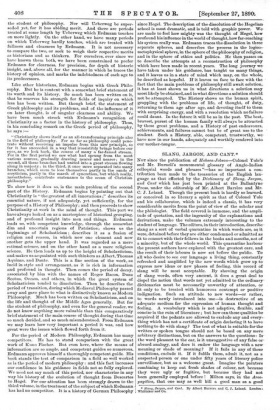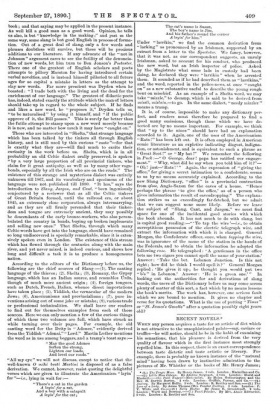SLANG, JARGON, AND CANT.*
NOT since the publication of Hobson-,Tobson—Colonel and Mr. Burnell's monumental glossary of Anglo-Indian colloquial words and phrases "—has so important a con- tribution been made to the treasuries of the English lan- guage as that effected by the Dictionary of Slang, Jargon, and Cant which has just been printed at the Ballantyne- Press, under the editorship of Mr. Albert Barrere and Mr. C: J. Leland. Though the present book is hardly so learned, or conceived in so literary a spirit as that of Colonel Yule and his collaborator, which is indeed a classic, it has very considerable merits from the point of view of the scholar and the philologist. The field covered is immense, and the ampli- tude of quotation, and the ingenuity of the explanations and. derivations, make the volumes extremely interesting to the student of language. The editors, in their introduction, describe- slang as a sort of verbal quarantine in which words are, as it were, detained before they are either condemned or admitted as- fit to consort with their fellows in the books and mouths, not of a minority, but of the whole world. This quarantine harbour the present authors have explored with the greatest care, and the result of their labours is now set before the public. To all who desire to see our language a living thing, constantly refreshed and amplified by the new words which grow up to express new ideas or new phases of feeling, this record of slang will be most acceptable. By showing the origin of slang words, often very ancient, it does a great deal to dispel the notion that words not yet admitted to the ordinary- dictionaries must be necessarily unworthy of attention, or fit only to be treated with humorous contempt or positive- indignation. Such an attitude to new words—or rather, to words newly introduced into use—is destructive of an adequate medium for the expression of human thought and feeling. A vocabulary which is not adaptive, flexible, and concise is the ruin of literature ; but how can these qualities be acquired if the pedants are allowed to exclude any and every-- thing which has not a certificate of origin declaring it to have nothing to do with slang ? The test of what is suitable for the written or spoken tongue should not be based on any mere arbitrary distinctions, but on the answers to the questions : Is- the word pleasant to the ear, is it unsuggestive of any-false or analogy, and does it endow the language with a new- meaning or shade of meaning ? If it fails in any of these conditions, exclude it. If it fulfils them, admit it, not as a . suspected person or one under fifty years of literary police surveillance, but as a welcome guest. Imagine the painters combining to keep out fresh shades of colour, not because they were ugly or fugitive, but because they had not been generally employed before ! Milton says, in the Areo- pagitica, that one may as well kill a good man as a good • Slang, Jargon, and Cant. By Albert Bartire and C. J. Leland. London: Whittaker and Co.
book ; and that saying may be applied in the present instance. As well kill a good man as a good word. Opinion, he tells us also, is but "knowledge in the making ;" and just m the same way, some slang is but good English in process of forma- tion. Out of a great deal of slang, only a few words and phrases doubtless will survive, but these will be precious additions to our literature. If any advocate of the "not in Johnson" argument cares to see the futility of the denuncia- tion of new words, let him tarn to Ben Jonson's Poetaster.
There one of the greatest of English scholars and poets attempts to pillory Marston for having introduced certain verbal novelties, and is instead himself pilloried to all future ages for so capital a mistake in letters as the attempt to slay new words. Far more prescient was Dryden when he boasted : "I trade both with the living and the dead for the enrichment of our language." The greatest of didactic poets has, indeed, stated exactly the attitude which the man of letters should take up in regard to the whole subject. If he finds and likes a new word, he "proposes it," Dryden tells us, "to be naturalised" by using it himself, and "if the public approve of it, the Bill passes." This is surely far better than the futile attempt to stamp upon a new word merely because it is new, and no matter how much it may have "caught on."
Those who are interested in "Shelta," that strange language which has been talked by the tinkers all through English history, and is still used by this curious "caste "—for that is exactly what they are—will find much to excite their curiosity in the work before us. Shelta, which is in all probability an old Celtic dialect orally preserved, is spoken "by a very large proportion of all provincial tinkers, who claim for it great antiquity, as well as by many other vaga- bonds, especially by all the Irish who are on the roads." The existence of this strange and mysterious dialect was entirely unknown till 1867, and its vocabulary and specimens of the language were not, published till 1880. "It has," says the
introduction to Slang, Jargon, and Cant, "been ingeniously conjectured by a reviewer that as all the Celtic tinkers of Great Britain formed, until the railroad era, or about 1845, an extremely close corporation, always intermarrying, and as they are all firmly persuaded that their tinker-
dom and tongue are extremely ancient, they may possibly be descendants of the early bronze-workers, who also peram- bulated the country in bands, buying up broken implements and selling new ones." That Shelta, through which many Celtic words have got into the language, should have remained so long undiscovered is specially remarkable, since it is exten- sively spoken even in London. The existence of this stream which has flowed through the centuries along with the main river, and yet never mixed, is indeed curious, and shows how long and difficult a task it is to produce a homogeneous nation.
According to the editors of the Dictionary before us, the following are the chief sources of Slang :—(1), The canting language of the thieves ; (2), Shelta ; (3), Romany, the Gypsy language, which has an Indian source, and resembles Urdu, though of much more ancient origin ; (4), foreign tongues, such as Dutch, French, Italian, whence direct importations have taken place ; (5), Yiddish, the vernacular of the modern Jews ; (6), Americanisms and provincialisms ; (7), pure in- ventions arising out of some joke or mistake; (8), various trade or professional technicalities. We Shall leave our readers to find out for themselves examples from each of these sources. Here we can only mention a few of the curious things of which these two volumes are full, which have struck us while turning over their pages. For example, the old canting word for the Deity is " Adonee," evidently derived from the Yiddish" Adonai," "Lord." Martin Luther mentions the word as in use among beggars, and a tramp's toast says :—
" May the good Adonee Soften the strong,
Lighten our loads,
And level our roads."
"All my eye" we will not discuss, except to notice that the well-known 0 mihi beati Martini is disposed of as a false derivation. We cannot, however, resist quoting the delightful verses which are given to illustrate the Americanism "lapin' for "—i.e., lying in wait for :—
" There's a cat in the garden - A URAL' for a rat, And a boy with a catapult A login' for the cat;
The cat's name is Susan, The boy's name is Jim, And his father's round the corner
A /*yin' for him."
Under " larrikin," we find the common derivation from "larking" as pronounced by an Irishman, supported by an. extract from a letter to the Spectator. We fancy, however, that it was not, as our correspondent suggests, an unruly Irishman, asked to account for his conduct, who produced. the new word, but an Irish inspector of police. Asked by the Magistrate what some lads in custody had been. doing, he declared they were " larrikin" when he arrested. them. It sounded as if he had described them as " larrikins," and the word, reported in the police-news, at once "caught, on" as a new substantive useful to describe the young rough bent on mischief. As an example of a Shelta word, we may take " mizzle," to decamp, which is said to be derived from
mislain,—to go. In the same dialect, "needy mizzler " means a tramp.
It is, of course, impossible to make any dictionary per- fect, and readers must therefore be prepared to find a good many omissions, though those which we have de- tected are by no means important. For example, we think that "up to the nines" should have had an explanation. accorded to it. Again, one of the uses of the Americanism " Rats !" has been left out. It is often employed in American. comic literature as an expletive indicating disgust, indigna- tion, or astonishment, and is equivalent to such a phrase as "Great Scot !" or "My hat !" We remember the following in Puck :—" 0 George, dear ! papa has ratified our engage- ment." "Why, what did he say when you told him of it ?"— " Oh ! just= Rats ! ' " Again, the expression of "giving the office," for giving a secret intimation to a confederate, seems to us by no means accurately explained. According to the new Slang Dictionary, " office " is a provincial contraction from ofese, Anglo-Saxon for the eaves of a house. "Hence perhaps the phrase to give the office,' as of a person who gives information the result of eavesdropping." The explana- tion strikes us as exceedingly far-fetched, but we admit that we can. suggest none more likely. Before we leave the subject of "Slang, Cant, and Jargon," we must find space for one of the incidental good stories with which the book abounds. It has not much to do with slang, but is capital good reading :—" To tap the wire '—i.e., to obtain surreptitious possession of the electric telegraph wire, and extract the information with which it is charged. General Morgan, the Confederate officer, once, when tapping the wire, was in ignorance of the name of the station in the hands of the Federals, and to obtain the information .he adopted the following ruse. He telegraphed : A gentleman in the office bets me two cigars you cannot spell the name of your station.' Answer : 'Take the bet. Lebanon Junction. Is this not right ; how did he think I would spell it F ' General Morgan. replied : He gives it up ; he thought you would put two " b's " in Lebanon.' Answer : He is a green one.'" In looking out the authorities for and derivations of slang words, the users of the Dictionary before us may come across plenty of matter of this sort, a fact which by no means lessens the book's merits. The work has, however, one serious fault which we are bound to mention. It gives no chapter and verse for its quotations. What is the use of putting " Times " or "St. James's Gazette" after a quotation possibly eight years. old



































 Previous page
Previous page